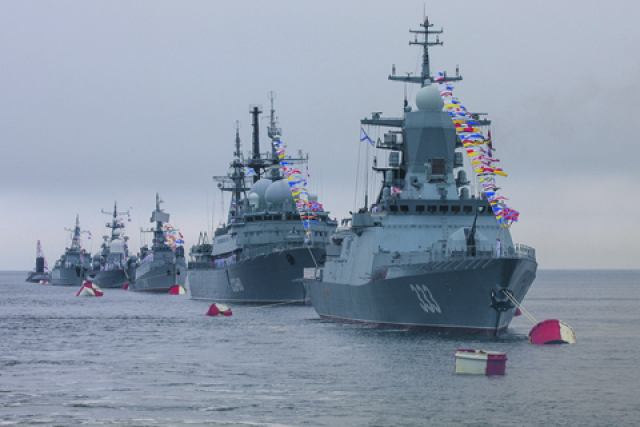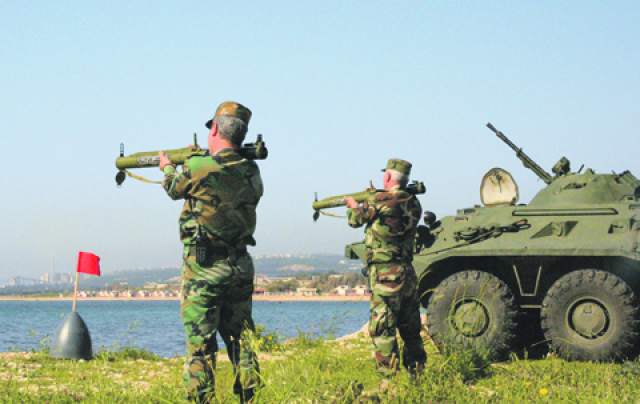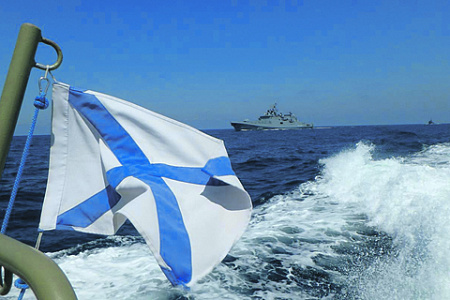What tasks will the Russian military base in Africa solve?
By analogy with the definitions of "North sea" and "black sea" in the Navy, the term "red sea" may appear. Obviously, this will be the name of military seamen serving in the logistics center (pmto), which the Ministry of defense of the Russian Federation intends to create in the Red sea.
The new MTO point is proposed to be located on the Northern outskirts of Port Sudan, on land allocated for the needs of the Armed forces of this country. A military hospital, an elite special forces unit, a College and the faculty of marine Sciences and fisheries of the prestigious red sea University are already located here.
The territory of the pmto will include the coastal zone, the water area and the mooring front zone with the water space and the bottom surface located below them.
The text of the "Agreement between the Russian Federation and the Republic of the Sudan on the establishment of a logistics support point for the Russian Navy on the territory of the Republic of the Sudan" does not differ much from a similar document signed with the leadership of the Syrian Arab Republic on the port of Tartus. The only difference is in the number of ships that can simultaneously be located at the point: in Tartus-11, in Port Sudan-four and in the number of personnel: in Tartus-1700, in Port Sudan-300. Otherwise, the documents are completely identical.
As they say, a bad start. After all, the same pmto in the Tartus area during Yeltsin's rule was reduced to two floating berths, one of which was broken, and several maintenance personnel.
There were doubts about the feasibility of creating a new pmto and the Russian leadership in 2017, when Kobar Omar al-Bashir (then President of Sudan), who is now sitting in the capital's high – security prison, flew to Moscow on a Russian plane and offered Vladimir Putin to place a naval base in Sudan. The government then considered it an expensive pleasure to maintain not only a full-fledged VMB, but even the pmto, so they were in no hurry to take advantage of the kind invitation.
In April 2019, a military coup took place in the African country. Lieutenant General Abdel Fattah al-Burhan became the de facto head of state. Despite the change of government, the position of the Sudanese side regarding the establishment of a Russian base in the Port Sudan area has not changed, and perhaps even strengthened. In turn, Russia immediately recognized the military leadership of Sudan that came to power. Apparently, Moscow is politically ripe for solving the issue of pmto, especially since it will not be necessary to pay for land rent.
FREE OF CHARGE – DOES NOT MEAN ANYTHING
For comparison, the most militarized country in the world, Djibouti, charges France $ 70 million annually for renting a military base, while the United States pays $ 200 million for its base. We will enjoy the hospitality of Sudan for free. But nothing is as expensive as a free service. At first glance, both sides show selflessness. However, not everything is as simple as it seems.
In agreement with the host party, the Ministry of defense of the Russian Federation will have the right to carry out major and current repairs, maintenance, improvement, reconstruction and demolition of real estate used by the Russian Navy, carry out capital construction on the allocated land plot, install floating berths, and perform dredging and underwater work at its own expense. The real estate of the Russian Federation will be transferred to the Sudan as soon as it is released due to the development of the pmto infrastructure, without any compensation for our expenses. As a bonus, the country's authorities will provide family members of pmto personnel who are citizens of the Russian Federation with the opportunity to work in organizations of the Republic of Sudan.
Sudan's gains from the deal with Russia are clear. Khartoum needs a Russian base primarily to neutralize American interference in the country's Affairs, as well as to stabilize the military and political situation in the region.
Sudan has a difficult relationship with its neighbors – Egypt and Ethiopia – because of the Nile water, which they can not share with each other. Moscow is a convenient mediator in this dispute, as it maintains good relations with both Cairo and Addis Ababa. If construction starts on the Nile with the participation of Russia of the Sudanese hydroelectric power station, Khartoum cannot avoid friction with Cairo, because the dam will block the Nile, which will cause a periodic decrease in the water level in the lower reaches of the river. Moscow's help in settling relations with Cairo will be very useful.
The previous Sudanese leadership wanted to receive from Russia small floating nuclear power plants, assistance in the construction of hydroelectric power plants on the Nile, as well as nuclear power plants with a capacity of 1.2 thousand tons. MW – exactly the same as the one recently built in Belarus. And also-s-400 anti-aircraft missile systems, su-30 and su-35 fighters.

Small rocket ships have limited autonomy. Being based in Sudan will expand the geography of their application. Photos from the site www.mil.ru
Based on such requests, Moscow naturally rejected Khartoum's proposals in 2017 – the economic costs clearly outweighed the military and political benefits. Today, either the requests of the new leadership of Sudan have become more modest, or Russia has conducted an audit of its own capabilities, but rather – it was a counter movement based on compromises.
What does Moscow offer? We will provide information on the sea surface, underwater air and hydrometeorological situation in the Red sea to the Sudan on a gratuitous basis, that is, free of charge, and will assist in hydrographic support, organization and implementation of underwater anti-sabotage and search and rescue support, and air defense of the Port Sudan naval base. Russia will assist in the development of its infrastructure, including the construction of a berth for the Republic's warships.
Russia will help in the development and construction of the armed forces of the African country. For these purposes, after the Agreement enters into force, the Russian side will supply weapons, military and special equipment in accordance with the procedure and terms determined by a separate Protocol.
According to the CIA, Russia, along with China, is one of the main suppliers of weapons to Khartoum. After signing the Agreement, we will probably do this for free.
PORT SUDAN IN THE MIRROR OF TARTUS
How much will the pmto in Port Sudan really cost us? When calculating, you can not do without comparing with Tartus. Although, as the ancients noted, any comparison is lame, it nevertheless gives an idea of the scale of our upcoming costs.
In December 2017, the Ministry of defense estimated the annual cost of expanding the pmto in Tartus at 3.2 billion rubles, or about $ 55 million at the Central Bank exchange rate - on the day of the announcement of this amount in the Federation Council on December 25. And they were already included in the budget. These expenses were covered by the budget allocated for the needs of the Ministry of defense.
A year later, in December 2018, an intergovernmental agreement on industrial and trade cooperation was signed. The road map includes 30 projects, including such a large one as the construction of an airport in Tartus.
A year later, in December 2019, Deputy Prime Minister Yuri Borisov, during a working visit to Syria, announced Russia's intention to invest $ 0.5 billion in the modernization of the port of Tartus over the next four years. "The Russian side intends to establish the operation of the old port and build a new commercial port," the Deputy Prime Minister explained. In addition, in some Syrian regions, it is planned to lay a new railway through Syria and Iraq to create a transport corridor "Mediterranean sea – Persian Gulf".
As the saying goes, appetite comes with eating. And they only started with some unfortunate point of the MTO.

Joint exercises of Russian and Syrian Marines in Tartus. Photo by RIA Novosti
A similar path is obviously to be followed in the Sudan. After all, this is the only way to gain a foothold in the country and ensure your political influence in the region.
In addition to Russia, Turkey was also interested in creating its base here. Other countries that wanted the key to the red sea turned to Djibouti for it. This small but most militarized country in the world is home to military bases in Germany, Italy, Spain, the United States, France and Japan, and more recently China.
Everyone wants to keep an eye on the main southern sea route connecting Europe with Asia. Even the Kingdom of Saudi Arabia, which is bordered by the red sea to the West and the Persian Gulf to the northeast, has decided to have a military base in Djibouti. The United Arab Emirates and other Gulf States are considering creating their own.
Russia could also set up a base in Djibouti – the country's authorities are always happy for those who pay a lot. And you would have to invest about $ 1 billion at once, not counting the annual rent for the land. Given the absurdity of such spending, Moscow limited itself to pmto in Sudan.
WHY DO WE NEED THE SUDANESE COAST
It would seem-where is Russia, and where is the Red sea. Nevertheless, for us, both this sea and the Gulf of Aden are of strategic importance in every sense of the word – economically, militarily and politically.
This is the shortest sea route between the ports of Southern Russia and the Far East, and in a more global view – the shortest route from the North Atlantic to the Indian ocean and the most important corridor for transporting oil from the Persian Gulf to Europe and North America. Its significance can only be compared with our Northern sea route.
It is difficult to overestimate the military and strategic importance of the sea, which is part of the area of responsibility of the Central command of the US Armed forces. It was through the Red sea that the main forces of the anti-Iraqi coalition were transferred in preparation for the military operation to liberate Kuwait in 1990-1991 and the operation against Iraq to overthrow Saddam Hussein in 2003.
In everyday Maritime practice, transits from the Atlantic to the Indian ocean through the Red sea are made by warships and auxiliary vessels of almost all fleets of the world, which systematically solve the tasks of combat service in these oceans.
Conceptually, as set out in the Maritime doctrine of the Russian Federation, our state is interested in ensuring the presence of the Navy in remote areas Of the world ocean, including in the Indian Ocean regional direction-to demonstrate the flag and military force, as well as to combat piracy.
From an economic point of view, Sudan is attractive for its reserves of minerals-hydrocarbons, gold, silver, and cobalt. The beginning of industrial development of rich deposits with the participation of Russian companies promises mutual benefits, even though some of them are located in disputed territories.
Finally, the presence of pmtos in the Central part of the red sea adds grounds for increasing our military traffic both from the Gulf of Aden and through the Suez canal.
From an operational point of view, Port Sudan is inferior to the Berbers in Somalia and the Bay of Qubeit Musa Nefit on the island of Nokra in Ethiopia, which had naval bases of the Soviet Navy. The base on the island of Nokra in the Dahlak archipelago was used by surface ships and nuclear submarines of the Pacific fleet, serving in the Indian ocean. Russian submarines will also be able to enter Port Sudan, but it will be more difficult for them to do this than in the Bay of Qubeit Moosefit: due to the hydrology of the sea, the high salinity of the water and for a tactical reason – the inevitable loss of stealth navigation. The Russian Navy will have to conduct a special operation to return the submarine from the red sea to the deployment routes in the Indian ocean.
The MTO point in Port Sudan will be much smaller than the one in Tartus, at least at first. Of the four ships that can be here at the same time, three will probably be on a permanent basis. This is a floating workshop, a floating dock, and a tug boat. Thus, the point will only be able to accept one more ship that will come for maintenance and resupply.
We can say with a huge degree of confidence that ships of the Pacific fleet will come here, which are still quite rare in the Indian ocean and especially rare in the Gulf of Aden and the Persian Gulf. The opening of the pmto is a serious bid to increase our military presence in this troubled region. If this happens in the future, the planned ship composition of the pmto will be clearly insufficient. Based on the tasks of the point and the services offered to the receiving party, it is desirable to have at least two tugs, a diving and fire boat, a supply vessel, two tankers, including one water-filling one. They won't show up if Toph is still a rare guest here.
Back in 2008, the then Russian defense Minister Sergei Ivanov complained: "unfortunately, we are not as often present in the Indian ocean as we would like." According to him, this required large financial resources, which at that time Russia allegedly did not have. Maybe it's time to return the Pacific fleet ships to the Indian ocean and the base in Port Sudan – the first step in this direction?
In geopolitical terms, this means the return of Russia to the Black continent and the restoration of its role in its Affairs, reduced to zero after the collapse of the USSR. The main thing is that our desires coincide with our capabilities.
Vladimir Gundarov
Vladimir Alexandrovich Gundarov-military observer.

